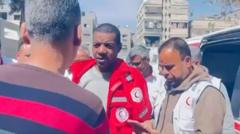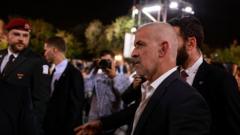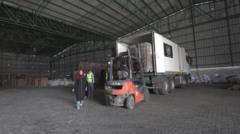As the International Court of Justice (ICJ) in The Hague began hearings regarding Israel's ban on humanitarian aid to the Gaza Strip, the United Nations has sharply criticized the situation. The hearings, which took place on Monday, did not see Israel field a legal representative, leading the nation to declare the proceedings biased.
Israel Faces International Scrutiny Over Gaza Humanitarian Aid Blockade

Israel Faces International Scrutiny Over Gaza Humanitarian Aid Blockade
The International Court of Justice hearings highlight growing tensions surrounding Israel's humanitarian blockade in Gaza.
For over a month and a half, Israel has enforced a blockade, preventing food, medical supplies, and humanitarian aid from reaching the besieged Gaza Strip. This action is purportedly aimed at compelling Hamas to release Israeli hostages. Israeli officials maintain that the blockade is within the bounds of legality, claiming adequate provisions exist in Gaza despite the obstacles.
In stark contrast, the U.N. and various aid organizations argue that the blockade exacerbates the dire conditions faced by Palestinians, who have suffered immensely due to ongoing conflict. Reports indicate that more than a year and a half of war has resulted in tens of thousands of fatalities and displaced over a million people in Gaza.
During a two-month cease-fire initiated in early January, aid was able to flow into Gaza, offering some relief. However, following the cessation of the truce in early March, the blockade was reinstated amidst escalating Israeli military operations against Hamas.
Elinor Hammarskjöld, the U.N.'s lead lawyer, stated on the opening day of hearings, "No humanitarian aid or commercial goods have been allowed into Gaza since March 2, which has devastating humanitarian consequences in the Gaza Strip." The U.N. General Assembly had previously asked the ICJ to provide an advisory opinion on Israel's responsibilities regarding humanitarian assistance. The hearings are expected to feature approximately 40 governments, though a final opinion from the court will take time to develop.
In stark contrast, the U.N. and various aid organizations argue that the blockade exacerbates the dire conditions faced by Palestinians, who have suffered immensely due to ongoing conflict. Reports indicate that more than a year and a half of war has resulted in tens of thousands of fatalities and displaced over a million people in Gaza.
During a two-month cease-fire initiated in early January, aid was able to flow into Gaza, offering some relief. However, following the cessation of the truce in early March, the blockade was reinstated amidst escalating Israeli military operations against Hamas.
Elinor Hammarskjöld, the U.N.'s lead lawyer, stated on the opening day of hearings, "No humanitarian aid or commercial goods have been allowed into Gaza since March 2, which has devastating humanitarian consequences in the Gaza Strip." The U.N. General Assembly had previously asked the ICJ to provide an advisory opinion on Israel's responsibilities regarding humanitarian assistance. The hearings are expected to feature approximately 40 governments, though a final opinion from the court will take time to develop.


















